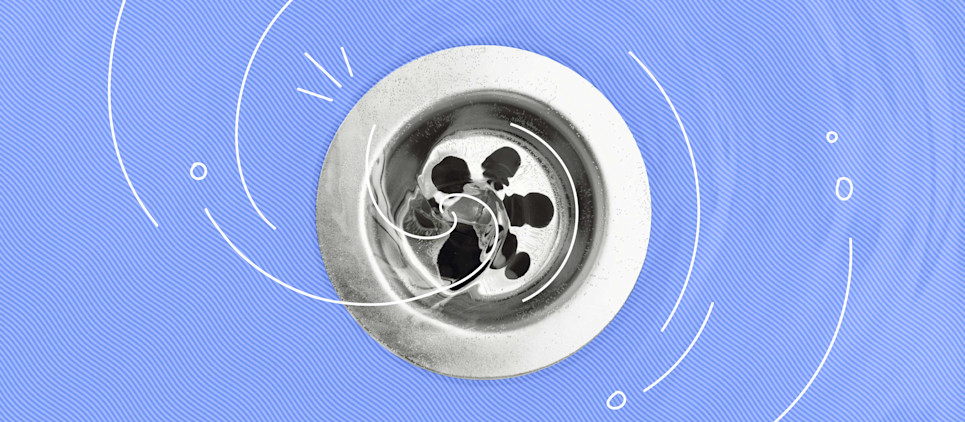Five easy ways to unclog your shower drain
If you notice a build-up of standing water during showers, or a bathtub that takes ages to empty, it may be time to investigate the state of the drain.

Table of contents
Why clogs happen in the first placeWhat to do if you suspect a clogged shower drain5 Ways To Unclog Your Shower Drain4 Tips for Preventing ClogsWhy clogs happen in the first place
A clogged drain is a slow drain. In the case of a clogged toilet or a clogged kitchen sink, a large obstruction may be to blame—but shower drains mostly slow down when they accumulate hair, lint, or residue from bath products over time. (That goes for bathroom sink clogs, too. Think of all that toothpaste!
“Think of all that toothpaste!”
What to do if you suspect a clogged shower drain
First thing’s first: check your drain for a visible obstruction. Clumps of hair are the most common culprit. If nothing is visible on the outside, look underneath your drain cap and into your drain. Use a flashlight if you need to. Remove anything you see that might be blocking the drain.
Next, double check that your drain is open. Is there room in between your drain stopper and the pipe for water to flow? How you do this depends on the type of drain and stopper you have: Some drains have a stopper that you can unscrew and lift out completely. Bathtub-showers often have a switch under the faucet that opens and closes the drain. Investigate if your drain has any sort of stopping mechanism and make sure that the stopper isn’t accidentally blocking the drain.
If you’ve removed any visible obstructions and verified that the drain is open, and water still isn’t draining, it’s time to unclog.

5 Ways To Unclog Your Shower Drain
Try these methods to remove or dissolve the clog.
Remove the clog by hand. Sometimes, a clog is immediately visible near the surface and easily accessible. Put on a pair of rubber gloves and extract the clog as best you can. There are small plastic hooks made just for this purpose. (It might be tempting to use a wire coat hanger here, but beware: doing so can damage your drain.)
Use a drain snake. A drain snake, also known as a plumber’s snake—is a retractable, flexible drilling tool you can pick up at hardware stores. You’ll use the snake’s hand crank to send a metal wire down your drain to either break up or pull out whatever is clogging it. Disposable plastic versions of the snake are also available—no cranking required, and you can even use it on a clogged toilet. Make sure to clean your drain snake after use.
Use a pot of boiling water. If there are no visible obstructions blocking the drain, and a drain snake has been unsuccessful, contact with boiling water can help dissolve softer build-up like soap scum around the edges. Repeat the process two or three times.
Use a natural drain cleaner. Conventional drain cleaners like Drano don’t usually work as well as they claim to, and they’re full of harmful chemicals. Natural homemade cleaners can be just as effective as chemical ones on light clogs. Mix together 1 cup of vinegar (distilled white vinegar works best) and 1 cup of baking soda. First, pour boiling water down the drain to loosen; then follow with the baking soda-vinegar mixture and wait 15 minutes. Rinse with more boiling water.
Call a plumber. If all of the above has had no effect on the speed of the drain, it’s time to call a professional.
4 Tips for Preventing Clogs
Use a drain cover. When it comes to clogged shower drains, snags of hair are almost always the cause. A basic rubber or plastic drain cover is an inexpensive way to capture any stray strands after every shower.
Skip the body scrubs. Body oils might make your skin feel amazing, but most of it winds up in the drain as you rinse off, hardening overnight as the pipes cool between uses. Avoid oily bath products, or save them for post-shower.
No excess waste. It can be tempting to empty a dustbin or shake out a rug into the shower and wash it away, but larger bits of dirt and debris can accumulate and make clogs worse later on.
Good drain maintenance. Make drain-cleaning part of your cleaning routine. Keep a bottle of distilled white vinegar or baking soda in the bathroom and pour a little of one or both down the drain after every few showers. Follow with a blast of hot water.
Looking for a home where monthly cleaning is always on the books? Bungalow offers private rooms in shared homes that are more affordable than solo housing options in the same neighborhoods. Wifi, utilities, and monthly cleaning are set up before you move in so that communal living is seamless. Find a Bungalow near you.
Ready to find your next home?
Move-in ready homes and a built-in community so you can feel at home, together — wherever you are.
Suggested articles



